#Siege of Toulon
Text

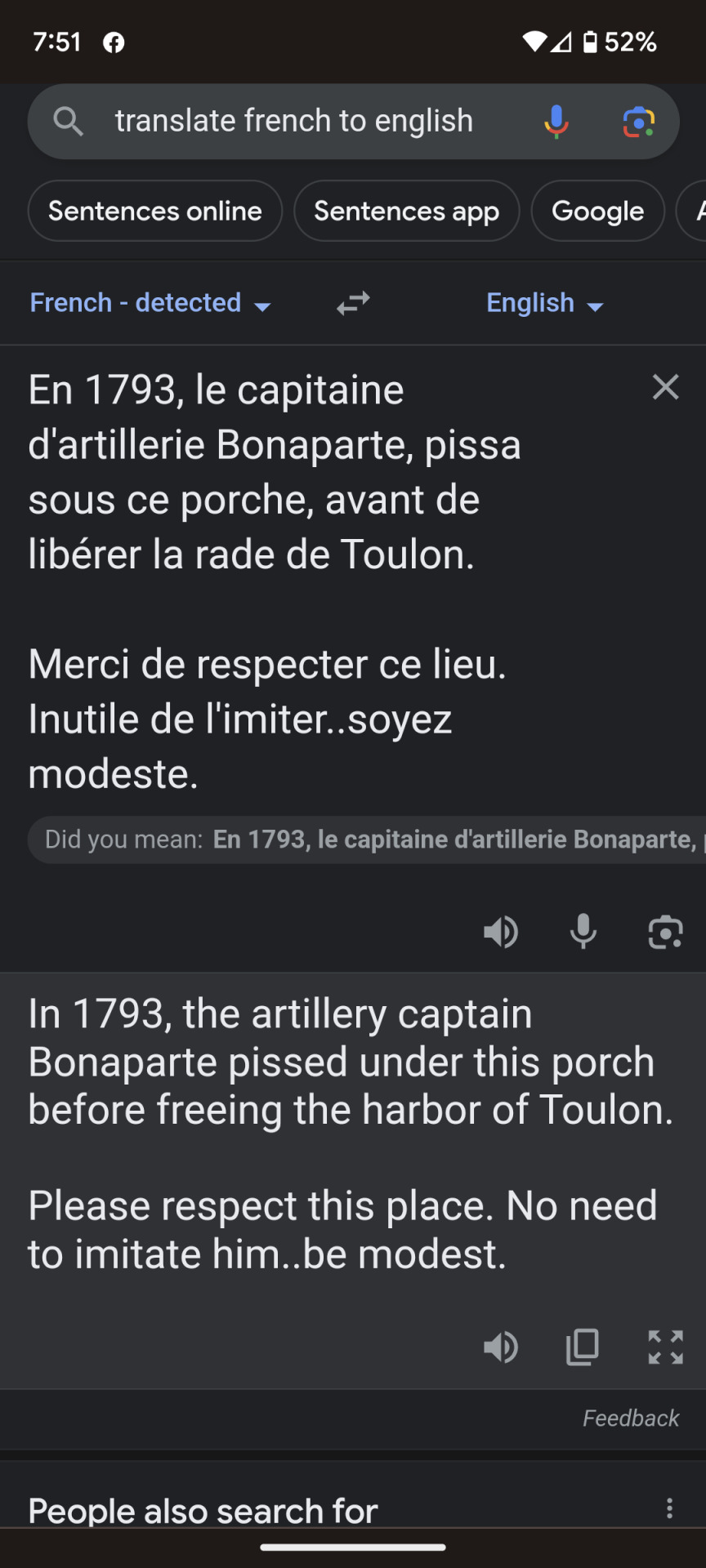
Oh...
249 notes
·
View notes
Photo

Napoleon's great battles: The siege of Toulon, 1793.
by LegendesCarto
66 notes
·
View notes
Text

Napoleon (2023)
#napoleon#joaquin phoenix#film#ridley scott#cinema#gif#gifs#napoleon bonaparte#napoléon bonaparte#napoléon#bonaparte#toulon#france#malta#europe#european#napoleonic#french revolutionary wars#siege of toulon#history
66 notes
·
View notes
Text
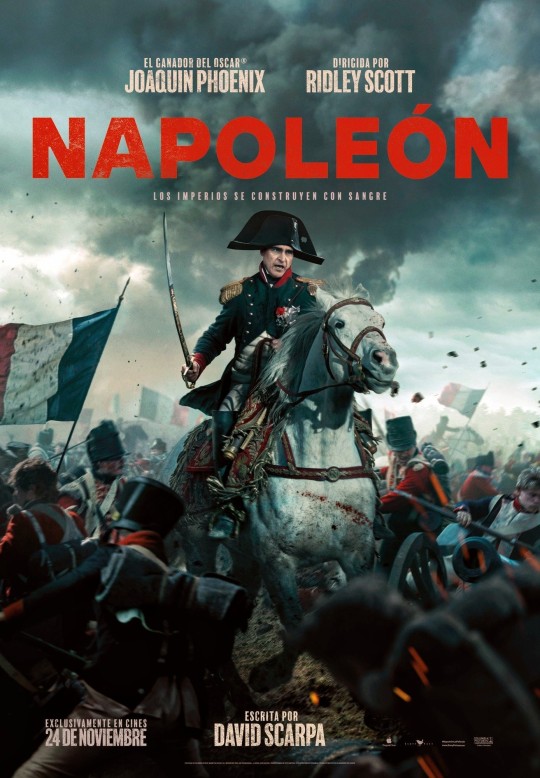
#ridley scott#history#politics#war#napoleon#joaquin phoenix#battle of morenga#siege of toulon#november 2023#film#november#19th century#movies#1800s
51 notes
·
View notes
Text
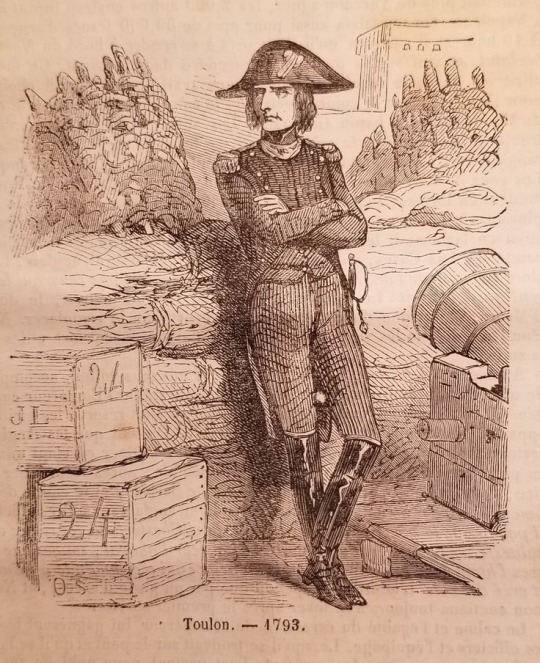
There he is
Toulon — 1793
#siege of Toulon#Toulon#France#battle of Toulan#Napoleon#napoleon bonaparte#french revolution#napoleonic#illustration#battle#art#1700s#18th century#history#historical art#drawing#military#military history#frev#napoleonic wars#historical#uniform
95 notes
·
View notes
Text

The Four of Toulon✨
#歴史創作#doodle#napoleonic#French Revolutionary Wars#Napoleon Bonaparte#Jean-Andoche Junot#Auguste de Marmont#Géraud Christophe Michel Duroc#Siege of Toulon
29 notes
·
View notes
Text
Chance
18 Vendémiaire, Year IV
(10 October 1795)
As far as cities go, by all rights, Paris should not exist.
She is massive and unwieldy and somehow manages to contain every walk of life and belief and thought that has ever occurred within her walls without wholly fracturing. She has survived the twenty-first of January as well as the ninth of Thermidor, and still she persists.
Napoléon hates Paris, but as he sips at his wine, he can’t help but admire her.
“Beg your pardon,” comes a voice from behind him.
Turning toward it, Napoléon sees a slight young man. He looks determined, even if that steel is tempered by the pink of his cheeks. “Yes?”
“Apologies for interrupting, but you wouldn’t happen to be General Buonaparte, would you?”
The title is new, and Napoléon bites back a pleased smile to hear it. “I might be.”
“The General Buonaparte who scared away those Royalist rioters the thirteenth of Vendémiaire with only a whiff of grapeshot?”
It had taken significantly more than a whiff, but as the inaccuracy only lends itself to his reputation, Napoléon doesn’t correct it. “It sounds as though you do not need me to tell you the answer.”
“I —” The man’s mouth opens, then shuts. “It is only that I have been following your work since the Siege of Toulon — that was a masterful bit of strategy, if I may say so.”
“The Siege of Toulon, you say?” He adjusts himself in his seat, narrowing his eyes as he tries to recall the dates. “That’s nearly two years gone now.”
“Frimaire of year II,” volunteers the young man. “After nearly four months’ stalemate.”
“Yes, yes.” He rubs his chin. “I assume that you’d been following the siege since before then.”
“I had.” The man looks ready to continue, then cuts himself off again.
The young man hardly appears to be the sort of company Napoléon should be keeping if he wants to be well-received among others of his rank — it is only thanks to 13 Vendémiaire that Napoléon even has the fine clothes that he wears now — but against his better judgment, Napoléon is intrigued. “Rather slow piece of action to be following,” he observes mildly.
The bait works. “My father was serving there. He says it’s thanks to you that he was able to return home.”
A fellow soldier! “Someone I’d recognize?”
The man shakes his head, a chagrined smile pasted on his face. “No, he said — he said he only admired you from a distance. He’d been there since the beginning of the siege. He used to write me letters.”
A dedicated father committed to a noble cause: it’s better than Napoléon has ever known. “I’d be glad to meet him, if he’s in the city.”
The pained smile remains, the man’s eyes now turned to the wooden floor of the establishment. “I’m afraid he passed some time ago. He sustained several injuries at the siege, you see, and one in particular … well, he unfortunately did not have much time left after. My grandfather — my mother’s father, he’s who I’d been living with at the time — supported Toulon, but when he received word that my father was not long for this earth, he sent me to see him, and the truth soon came out.”
“I see.” He nods slowly before meeting the gentleman’s eyes again. “What of your grandfather these days? Do you still stay with him?”
The young man shakes his head. “I did for some time after the discovery, but only through biting my tongue and keeping my head low. After the Royalist riots, however, my grandfather and I had an argument, and I decided that I could bear it no longer. I have been staying with a friend since.”
Napoléon takes a slow drink, eyeing the young man as he does. “What do you call yourself?”
This, of all things, is what it takes to make him stammer. “M-Marius, Sir.”
“Marius.” Napoléon swishes his thoughtfully wine in its glass. “Tell me, Marius: do you have military aspirations?”
At this, the young man — Marius — appears even more flustered. “Ah, I’m afraid not, Sir. I’m in law.”
“Law,” Napoléon repeats, amused. “You’ve more backbone than any man of law I’ve ever met. Here, sit with me, allow me to buy you something.”
“I — thank you, Sir. I would like that a lot.”
“I thought you might,” smiles Napoléon, raising a hand to wave down a waitress. “How familiar are you with the goings-on of Italy and Austria right now?”
#empereur's mercy week#empereur's mercy#shitposting sometimes writes#the AO3 link is in the title#napontmercy#siege of toulon#13 vendémiaire#three francs
9 notes
·
View notes
Text
Napoleon - Movie Review
Disclaimers: 1. Quotes by Napoleon are not from the movie. 2. The movie has been criticized for possible historical inaccuracies and I have not corroborated historical details.
Power is my mistress. I have worked too hard at her conquest to allow anyone to take her away from me. – Napoleon Bonaparte
In the movie “Napoleon”, writer David Scrapa and director Ridley Scott tell the story of…
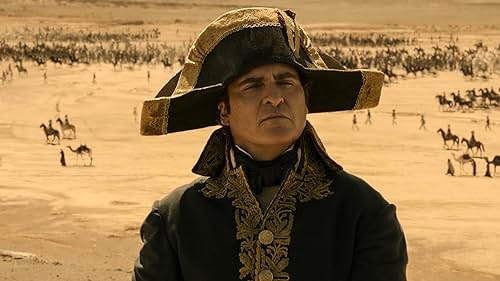
View On WordPress
#David Scarpa#French Revolution#Joaqin Phoenix#Napolean Bonaparte#Ridley Scott#Siege of Toulon#Vanessa Kirby
0 notes
Text
Research for Historical Fiction
Researching for historical fiction can seem like a daunting prospect. It’s hard to know where to begin when you want to write in detail about a specific event. Here’s how I do my research, im case anyone else finds it useful.
Initial Steps
My first port of call is usually Wikipedia, despite the fact it can be rather inaccurate at times. It’s very useful for getting an over-arching idea of what you are researching, as well as any places where you want to know more. For example, I was recently researching the Siege of Toulon in 1794, and the Wikipedia article highlighted the fact I needed to know more about where the French forts were positioned, and get a better idea of the tactics.
Next I head over to YouTube and this lovely hellsite. YouTube often has useful explanatory videos, and I find having visual maps explained to me much more useful that reading text on the same subject. As for here, there are many lovely people specialising in historical eras, and it’s not hard to find them and ask questions.
Digging Deeper
Once I have a rough idea of the thing in researching, I spend some time looking for specific details I want to incorporate.
I Always love using books, and I’m lucky enough to have several on most of the subjects I’m interested in. For the Toulon research, I looked through my biographies of Napoleon, to see what they had to offer on N’s reactions to the incompetency of the generals, positioning of forts etc. This also gave me the names of some of the more useful forts, and notes about Larrey, who I wanted to add into the story as a long term character.
Then, I started scouring the internet, using both the English and the French versions (although I’m awful at reading French), as I wanted to find out how many cannon were stationed at each fort, and where on earth French headquarters were. This took ages, and was very frustrating, but I did eventually find the things I was looking for.
Remembering all the Facts
Doing research is of little use if you forget what you’ve learnt, so I find taking notes as I go along is invaluable. I prefer to use pen and paper, but digital notes, or voice messages, work just as well, so long as you have the facts stored somewhere useful.
Remember! Not all your research needs to go into your story. I always leave facts out, because they just don’t fit into the arc of a chapter, or it doesn’t seem necessary to the plot. The point of research is to build up a believable world for the characters to live in, not to repeat history word for word.
I hope this helps, and happy writing!
#writeblr#creative writing#historical fiction#research#the Siege of Toulon#MR#A Monsterous Regiment of Women#writing advice
2 notes
·
View notes
Text
Thinking rn of when Elizabeth Taylor, at 37, wanted to play anne boleyn in Anne of the thousands days and was told she was “too long in the tooth” and this was like, nodded and agreed with even by feminist scholar Susan bordo in creation of Anne boleyn
And then I had to go see Napoleon and see a geriatric Joaquim Phoenix limp across the siege of Toulon. A near 50 year old man playing a 23 year old, even as he flirts with a woman who is meant to be 6 years his senior but is actually precisely the age Josephine should be, in her 30s, in contrast to his, again, late 40s.
And it’s like hm.
Hmm.
Hmmmmmmm.
You can play Young Napoleon at 23 when you’re 50
But you can’t play Anne Boleyn, who may have died when she was about 32, at 37. I wonder why. Hmm. I wonder. I wonder,, I wonder why that is, hmmmmmm
398 notes
·
View notes
Text
Just finished seeing Napoleon (2023) for the first time! I liked it more than I thought I would. The comedy bits were funny and the core relationship of Napoleon and Josephine was engaging even if all the other characters were pretty flat.
I don’t know much about Napoleon post-emperor but the history at least before that was unsurprisingly pretty all over the place.
SPOILERS (this is a bullet pointed list of moments mostly from the first quarter of the movie set during the French Revolution/Directoire) (EDIT: I just saw the movie for a second time so I added amendments/clarifications in red)
the movie opens with a text scroll summarizing in very vague terms what led to the French Revolution
The first real scene is Marie-Antoinette being guillotined while Ça ira is sung. Her execution is then immediately followed by Robespierre giving his “Terror and Virtue” speech very menacingly
Didn’t care for the guy casted as Robespierre didn’t really look like him and was too old. He just comes off as a generic “power hungry” politician in a powdered wig
When Napoleon first charges at the siege of Toulon a cannon hits his horse right in the chest and Barras has to awkwardly help Napoleon off the ground
The next day Napoleon is awarded for taking Toulon and for some reason the gored horse is still there. Napoleon reached his hand inside the horse and grabs the cannon ball
A scene or two after Toulon they show Thermidor where the whole convention turns on aspiring dictator Robespierre
Barras is in the balcony of the Convention and specifically yells that Robespierre wants to be “judge, jury and executioner”
This Robespierre runs away as a crowd of deputies chase him up the stairs. Someone in a chair that might have been an 18th century wheel chair falls over but the scene happens so fast I wasn’t sure
I believe it was just a regular chair tossed over during Thermidor but I’m still not entirely sure since there is some kind of either design or mechanism on the side of the chair
Robespierre pulls a gun on the mob of deputies chasing him but the gun jams so he pulls out a second gun and shoots himself
Barras says “you missed” and then fingers his jaw wound to I guess parallel Napoleon and the horse
A little later Napoleon is at the Victim’s ball and Josephine is seen there next to Barras.
Thérésa Cabarrus is also in the cast list but she is never named in the movie so I assume she will be in the Director’s cut
Josephine and a woman hug while leaving prison so that’s probably Cabarrus but her name is never said
There’s also a scene that starts with Barras and Napoleon goofing around together and throwing nuts at a wall which is sweet I guess
Weirdly Barras is the only male character Napoleon seems to be genuinely friendly with
I was wrong it was his brother Lucien not Barras that Napoleon was goofing around and throwing nuts with which makes more sense. I must have gotten their mullets confused
Napoleon returns from Egypt in this movie because he hears Josephine is cheating on him
the newspapers he gets from the English aren’t stories on how the Directoire is unpopular/corrupt but instead cartoons of him being cucked
(This is foreshadowing for the worst part of the movie)
The only real Fouché scene is when Napoleon is sitting with the Directors telling them how he’s going to coup them and it’s going around the table getting their reactions as Napoleon calls their names
Then Napoleon says Fouché and it cuts to a guy standing in the corner of the room
Talleyrand is a more important part of the movie and is given some of historical Fouché’s moments (I liked his actor a lot actually and he’s the best character besides the core two)
Barras also stops being a character after he agrees to resign as director but he continues to show up in the background throughout the movie
This is SPOILERS AGAIN for the end of the movie but I have to mention this because it was an insane decision
———————————————————————
While Napoleon is in Elba the Tsar of Russia rolls up to Josephine’s manor in a carriage and is “entertained” by her
Napoleon sees a cartoon of him being cucked again in the newspaper and that is why the Hundred Days happens
#napoleon#napoleon (2023)#robespierre#frev#french revolution#fouché#barras#josephine beauharnais#talleyrand
114 notes
·
View notes
Text

Saw this on Pinterest
The Siege of Toulon 1993
11 notes
·
View notes
Text
It’s been a while since I’ve done some Gourgaudposting. Here is his entry from 18 September 1817, featuring Napoleon’s commentary on Junot, which shares some noticeable parallels to Napoleon’s St Helena rants about Murat—he committed nothing but sottises (follies/stupidities), he was a womanizer, he never should’ve been promoted so high etc.
***
Thursday, 18 (September 1817) – At 5 o’clock, the Emperor pays a visit to Mme de Montholon. The colonel of the 12th Regiment, arriving to the island from France, goes to Bertrand’s, asks to be received, but His Majesty responds that he is indisposed.
After my dinner, His Majesty summons me, treats me well, and speaks to me of the Russian campaign. “At Ostrowo and Witebsk, I managed to cut the Russian army off from the road to Petersburg. At Smolensk, Junot committed nothing but follies, as well as at Valoutina; I sent you there. It was you who came to tell me he could cut off the Russian rearguard, but that he couldn’t decide to go ahead with it. You asked him: Monsieur le Duc, if the Emperor inquires why you have not marched, how should I answer him? He replied in an embarrassed tone: ‘You say that night has come and that I’ve taken position.’ So, I dismissed him at night.” – “In the morning, Your Majesty, on horseback, sent General Denorval to prevent me from waking up, because I was tired. This surprised everyone, and they thought my fortune had been made.”
The Emperor, after a moment of silence, resumed the conversation: “I met Junot at the siege of Toulon. He was quartermaster in a battalion of the Côte-d’Or; I needed writers, I had requested one from Gavais, commandant at Fontainebleau in 1814, who was then at the head of this battalion. He sent me two of them. Junot arrived first, I took him, he pleased me. Being, the same day, in my battery, I had him write a letter; a cannonball covered us with earth, and he exclaimed: Good, there’s the ash for the letter! He had a superb hand, and he remained with me. The other quartermaster was, a long time afterwards, still a noncommissioned officer, while Junot had a great advancement. Such is fate. Junot has never been anything but a swashbuckler, a ferocious philanderer. He loved to surround himself with nobles. I never should have given him command; in the last days, he wanted to be marshal. At Valoutina, he was already insane.”
His Majesty critiques the book attributed to him.
***
Source: General Gourgaud, Sainte-Hélène - journal inedit de 1815 à 1818.
57 notes
·
View notes
Text

Napoleon at Toulon (The Siege of Toulon) 1793
by Jacques Onfroy de Bréville
#napoléon bonaparte#napoleon bonaparte#toulon#siege of toulon#art#napoleonic#french revolutionary wars#history#france#french#europe#european#siege#jacques onfroy de bréville#job#illustration#napoleon#bonaparte#napoléon#mediterranean#cannon#cannons#artillery#cannonball#cannonballs
111 notes
·
View notes
Text
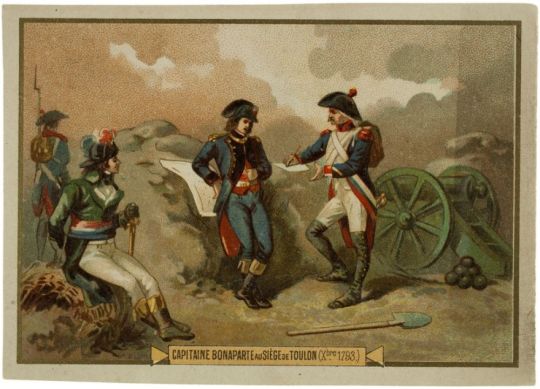
Napoleon at the siege of Toulon.
52 notes
·
View notes
Text
At the siege of Toulon in 1793, Napoleon (who was then 24 years old) was trying to order the soldiers to move forward, but the battery was in a very exposed position and many thought it was a suicidal order. How did Napoleon deal with this situation? He renamed the battery to “Batterie des hommes sans peur” or Battery of the men without fear. Turns out men will risk anything to not be seen as cowards because they all volunteered to take the battery after that.

#and then Napoleon got stabbed#but at least he didn’t have fear lol#long haired Napoleon tales and adventures#siege of Toulon#Napoleon#napoleonic#Toulon#napoleon bonaparte#french revolution#frev#napoleonic era#first french empire#french empire#france#job#job the illustrator
25 notes
·
View notes